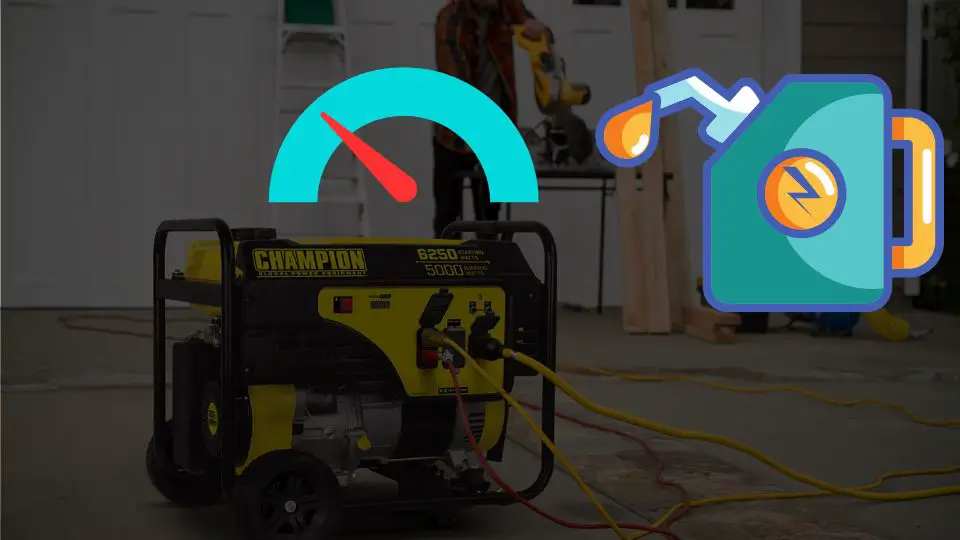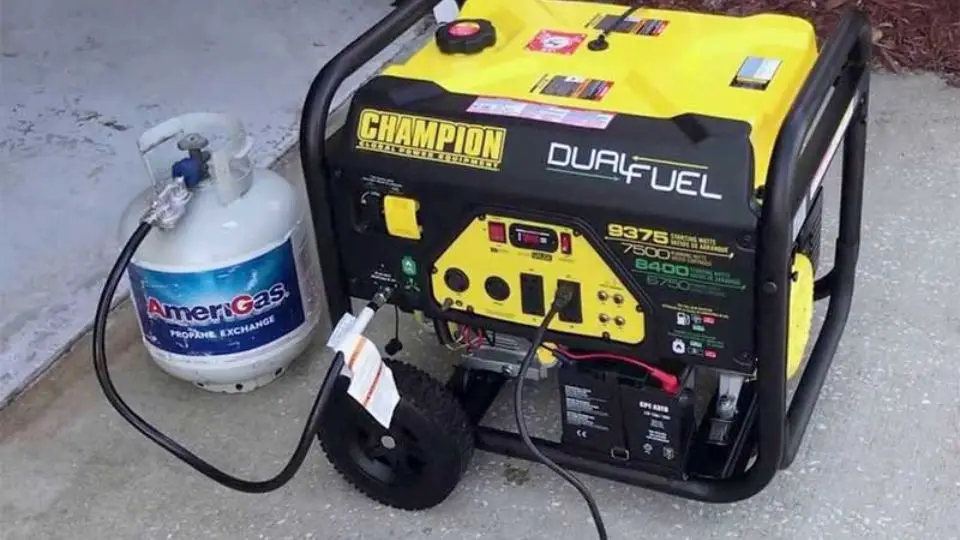This post may contain affiliate links. As an affiliate, we earn from qualifying purchases. We get commissions for purchases made through links in this post.
Generators play a crucial role in providing power for electrical devices in remote locations where there is no access to the home electrical line. They also often serve as backup power for homes. When using a generator, one of the most important aspects to consider is how much gas does it use. The amount of gasoline a generator uses determines the costs of running as well as how often it needs refueling.
On average, generators consume 0.6 to 1 gallon of gas per hour. For comparison, when running a generator on propane, it will use around 3 gallons per hour.
Fuel usage depends on factors like generator size, power output, and load. For instance, a 10,000-watt generator running constantly for 24 hours would consume 20 to 40 gallons of gas daily. The same generator will burn 24 to 72 gallons of propane for the same period.
Some other factors that affect gas consumption include fuel quality, generator power efficiency, generator type, and regular maintenance. This article explores gas usage in generators, provides some numbers, and a few tips on estimating fuel consumption to help save money on gas.
Understanding Generator Fuel Consumption
Understanding the multitude of factors that influence a generator’s fuel consumption is crucial, particularly for individuals who rely on continuous and frequent generator usage. In the following section, we will delve into the most significant considerations that impact how much gas a generator use. Later in this article will provide estimates of fuel consumption per hour for different generator sizes, along with examples of popular generator models and their gas usage.
Factors that Affect Gasoline Consumption
Several factors can affect the fuel consumption of a generator. These include:
- Generator Size: The size of a generator determines its power output and fuel consumption. Larger generators consume more fuel than smaller ones because they produce more power. However, they can be more fuel efficient under half load when compared to fully-loaded small models. Size is measured in running Watts.
- Load Percentage: The amount of power a generator produces depends on the load it is carrying. The more loaded the generator is, the more fuel it will consume.
- Fuel Type: Different types of fuel have different energy densities, which can affect fuel consumption. For example, diesel generators are more fuel-efficient than gasoline generators, while propane has smaller efficiency.
- Quality of gas: You should always use 87 octane gas with less than 10% of ethanol, or even better, premium non-ethanol gasoline, for better fuel efficiency and extended generator lifetime.
- Power efficiency: When a gas generator has high power efficiency, it can generate the same amount of electrical power with less gasoline compared to a less efficient generator. This translates to longer runtime per unit of fuel, allowing the generator to operate for a longer period before requiring refueling. It is measured in percentage and you should generally try to get a generator with 80% efficiency as a minimum.
- Regular maintenance: Scheduled maintenance, such as cleaning filters, adjusting spark plugs, and monitoring fuel systems, optimizes generator performance, reduces fuel waste, and improves gas efficiency. This reduces fuel usage, so we recommend you not deviate too much from the maintenance schedule.
- Environmental Conditions: The temperature, humidity, and altitude of the location where the generator is operating can affect its fuel consumption. Generators consume more fuel in hot and humid environments and at high altitudes.
Types of Generators and Fuel Efficiency
There are two main types of generators: conventional generators and inverter generators.
- Conventional Generators: Also known as standard or traditional generators, they are mechanical machines that combust fuel and produce electricity. Conventional generators are well-known for durability and ease of use, making them ideal for applications such as domestic backup power, construction sites, and outdoor events. They are very reasonably priced, even if you purchase a large model. However, it is important to remember that traditional generators always consume more fuel than inverter generators, which are built for increased fuel efficiency and quieter operation.
- Inverter Generators: These produce electricity using modern technologies. In contrast to conventional generators, which generate electricity while rotating at consistent speeds, inverter generators can alter their RPM. They use electronic circuitry that converts the initial AC current into DC and then back into stable AC. This technology allows inverters to produce more consistent and cleaner power while also being far more fuel-efficient than traditional generators.
How much gas does a generator use per hour?
When it comes to generators, one of the most important factors to consider is fuel consumption. Knowing how much gas a generator uses per hour is crucial, as it can help you determine how long it will run before needing to be refueled.
On average, a gas-powered generator will burn about 1/2 of a gallon of gas per hour. However, the actual amount of fuel consumed can vary depending on several factors, including the generator’s wattage, load, and efficiency.
For example, a 5000-watt generator running at 50% load will consume around 0.5 gallons of gas per hour. On the other hand, a 10,000-watt generator burns roughly 0.8 GPH of gas, while a 15-kW gas generator’s fuel consumption is nearly 1.3 gallons per hour.
It’s important to note that different types of generators will have different fuel consumption rates. For instance, inverter generators tend to use much less fuel per hour than conventional ones. Additionally, if you are planning to buy a big generator of 15kW and up, and use it as a home-backup power, it is recommended to go with a diesel (as much more efficient) or natural gas (as more environment-friendly) solution.
To help you better understand how much gas a generator uses per hour, the table below provides some general estimates based on generator wattage:
| Generator Size (Watts) | Gas usage (GPH) at 50% load |
|---|---|
| 2,000 | 0.17 |
| 5,000 | 0.42 |
| 7,000 | 0.59 |
| 10,000 | 0.84 |
| 15,000 | 1.3 |
Keep in mind that these are just estimates for average consumption, and actual numbers may vary based on several factors. It’s always a good idea to consult the manufacturer’s specifications or seek professional advice to determine the exact fuel consumption rate of a specific generator model.
Popular generator models and gas usage
When it comes to generators, there are several popular models that people tend to use. Here are a few of them, along with their fuel usage (in Gallons per Hour):
| Generator Model | Rated Watts | GPH (at 50% load) |
|---|---|---|
| Honda EU2200i | 1,800 | 0.12 |
| Westinghouse WGen6000 Generator | 6,000 | 0.51 |
| Champion Power Equipment 100813 | 7,500 | 0.71 |
| Generac 7683 GP6500 | 6,500 | 0.66 |
| A-iPower SUA12000E | 9,000 | 0.78 |
| PowerSmart Inverter Generator 4400 | 3,500 | 0.25 |
As the table shows, fuel usage can vary greatly depending on the generator model and size.
For instance, the Honda EU2200i is a compact generator with a rated power of 1,800 Watts. It boasts a relatively low fuel consumption rate of 0.12 gallons per hour (GPH) at 50% load. This generator is ideal for scenarios where you require a moderate amount of power while prioritizing fuel efficiency and portability. Of course, this generator is quite small and will not work as a home backup solution or a source for power tools.
The Westinghouse WGen6000 Generator, on the other hand, offers a much more power of 6,000 running Watts. It consumes fuel at a rate of 0.51 GPH on half load. With its increased power output, this generator is suitable for situations that demand a greater amount of electricity, such as running multiple appliances or powering larger tools.
If you need even more power, the Champion Power Equipment 100813 provides a rated power of 7,500 Watts. It consumes fuel at a rate of 0.71 gallons per hour when loaded by 1/2. This generator is a good choice for scenarios where you require substantial power, such as during emergencies or for powering equipment in a workshop or construction site.
The Generac 7683 GP6500 offers 6,500 running Watts and consumes 0.66 gallons per hour while 50% loaded. It strikes a balance between power output and fuel consumption, making it a versatile option for various applications, including powering household appliances, tools, and small to medium-sized equipment.
For those in need of even greater power, the A-iPower SUA12000E provides a rated power of 9,000 Watts. It has a fuel consumption rate of 0.78 GPH at 50% load. This generator is suitable for scenarios where high power requirements are essential, such as running heavy-duty equipment, and backup power during outages, or larger events.
Lastly, the PowerSmart Inverter Generator offers a rated power of 3,500 Watts. It has a low fuel consumption rate of 0.25 gallons/hour at half load. This generator is designed for situations where portability, noise reduction, and fuel efficiency are important considerations, such as camping, tailgating, or powering sensitive electronics. Fairly good inverter model, if you ask.
Tips for Reducing Fuel Consumption
There are several ways to reduce the fuel consumption of a generator. Here are some tips that can help:
- Regular Maintenance: Proper maintenance of the generator can significantly reduce fuel consumption. Regularly changing the oil, air filter, and spark plugs can help the generator run more efficiently and use less fuel.
- Match Load Size to Engine Power: Running a generator that is too small for the load can cause it to work harder than necessary, resulting in higher fuel consumption. On the other hand, running a generator that is too large for the load can also waste fuel. It’s important to match the generator’s engine power to the load it will be powering.
- Switch off Unnecessary Appliances: Turning off appliances that are not in use can reduce the load on the generator and lower fuel consumption. For example, turning off AC or a heat pump when not needed can help save a lot of fuel.
- Get Rid of Carbon Deposits: Carbon deposits can build up in the generator’s engine and reduce its efficiency, leading to higher fuel consumption. Regularly cleaning the engine can help prevent this.
- Use the Right Fuel: Using the right fuel can also help reduce fuel consumption. Some generators are designed to run on specific types of fuel, and using the wrong fuel can cause the generator to work harder than necessary.
- Minimize Idling: Allowing the generator to idle for long periods can waste fuel. It’s important to turn off the generator when it’s not in use or when the load is low.
By following these tips, it is possible to reduce the fuel consumption of a generator and save money on fuel costs.
How much gas does a 7500-watt generator use?
A 7500-watt generator is a popular choice for households and small businesses as it can provide enough power to run multiple appliances during a power outage. However, it’s important to know how much gas a generator of this size consumes to ensure that you have enough fuel on hand to keep it running. On average, a 7500-watt generator will burn 0.60 to 0.8 gallons of gas per hour. This range depends on various factors such as the load on the generator, the type of gas it uses, and the generator’s efficiency. For instance, a generator running at half load will consume less fuel than one running at full load.




1 thought on “How Much Gas Does A Generator Use?”
Comments are closed.